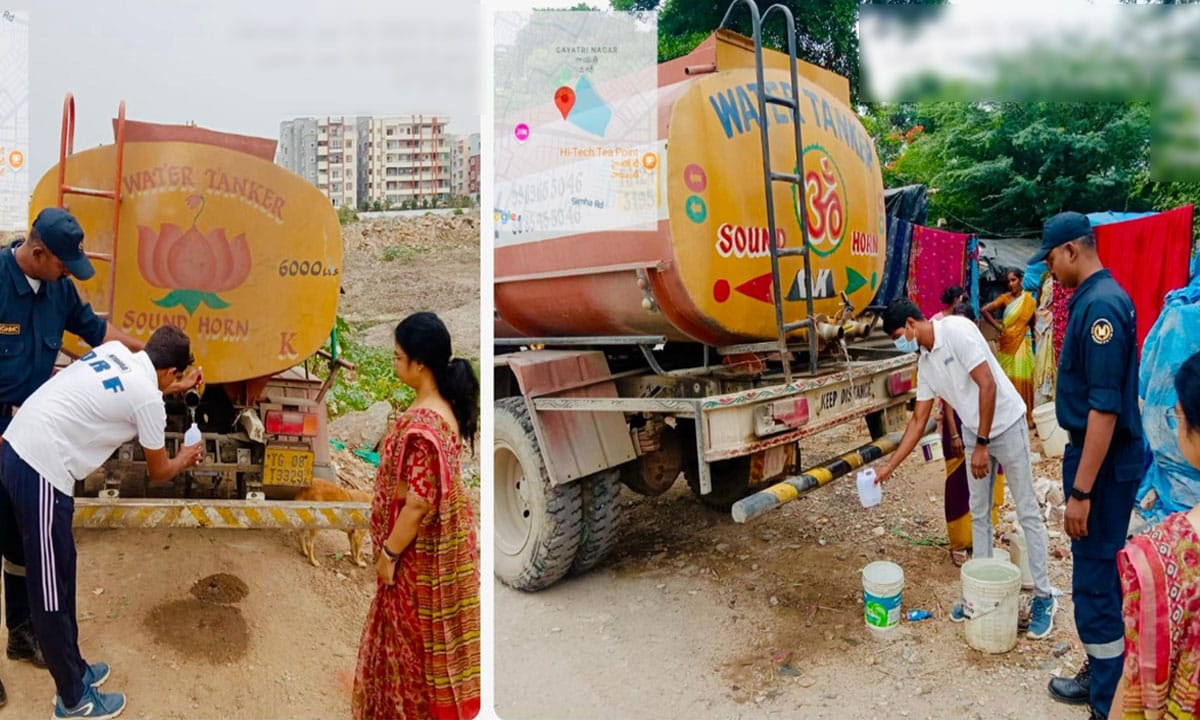Hyderabad: Toxic Water Crisis Near Sunnam Cheruvu: Health of Students at Risk, HYDRAA Cracks Down
Operators have drilled illegal borewells near Sunnam Cheruvu, and the polluted groundwater is being sold as drinking water.

Hyderabad: A shocking revelation has come to light near Sunnam Cheruvu in Madhapur, where illegal borewells are supplying toxic groundwater to hostels, hotels, and educational institutions. Despite the foul smell and visibly polluted surroundings, water business operators are extracting groundwater and distributing it through tankers, endangering thousands of lives — especially students.
Table of Contents
Contaminated Water Being Supplied to Hostels and Institutions
Operators have drilled illegal borewells near Sunnam Cheruvu, and the polluted groundwater is being sold as drinking water. This is particularly alarming for students preparing for competitive exams like IIT and medical entrance tests, who depend on nearby hostels for accommodation.
Locals report that the stench near the lake is unbearable, yet the water from these borewells is being transported to areas in and around Madhapur, putting unsuspecting residents and students at grave risk.
PCB Study Unveils Dangerous Levels of Heavy Metals
As part of its lake restoration initiative, HYDRAA collaborated with the Pollution Control Board (PCB) to test groundwater samples in the area. The findings revealed excessive levels of heavy metals such as Lead (Pb), Cadmium (Cd), and Nickel (Ni) — far beyond international safety standards.
PCB’s study revealed:
- Lead levels were 7 to 12 times higher than the safe limit.
- Cadmium was 2 to 3 times over the permissible level.
- Nickel was found in double the allowed concentration.
Lead in Water: 12 Times Over the Limit, Damaging Brain and Kidneys
As per global health standards, the permissible level of lead in drinking water is 0.01 mg/litre. However, samples from borewells near Sunnam Cheruvu showed levels between 0.073 and 0.122 mg/litre. This can impair brain function, reduce memory, and even affect reproductive health and kidney function, especially in children and young adults.
Cadmium and Nickel Pose Cancer, Bone, and Skin Risks
- Cadmium, ideally not exceeding 0.003 mg/litre, was found up to 0.010 mg/litre in some samples. High cadmium exposure can damage kidneys, weaken bones, and increase cancer risk, as confirmed by international research.
- Nickel, usually safe at 0.02 mg/litre, was detected at 0.038 – 0.046 mg/litre, which may cause skin conditions, liver damage, and high blood pressure.
Boiling Won’t Help: Metals Stay Even After Heating
Medical experts warn that boiling water doesn’t eliminate heavy metals like lead, cadmium, or nickel. In fact, boiling may concentrate the contaminants further. These toxins settle deeper into the water and become more dangerous with prolonged exposure.
The PCB notes that similar contamination is likely around other urban polluted lakes and sewage drains in Hyderabad.
HYDRAA Registers Police Cases Against Illegal Water Suppliers
HYDRAA has taken legal action by filing police cases against individuals and businesses who are selling contaminated groundwater from the Sunnam Cheruvu region as drinking water. The organization has vowed strict enforcement and warned violators of heavy penalties.
Sunnam Cheruvu Gets Top Priority in Lake Restoration
Due to its critical condition, Sunnam Cheruvu has been prioritized in HYDRAA’s lake restoration project. It is one of six lakes being revived in Hyderabad, including Thammidikunta, Kukatpally Nallacheruvu, Uppal Nallacheruvu, Bathukamma Kunta in Amberpet, and Bamruk Nuddowla in Old City.
Located on the border of Serilingampally and Kukatpally, between Guttala Begumpet and Allapur villages, Sunnam Cheruvu spans 32.60 acres. HYDRAA is investing ₹10 crore to clean, decontaminate, and transform it into a safe and sustainable water body.
A Call for Vigilance and Action
With the lives of thousands — especially students — at stake, authorities are urging educational institutions and hostels to verify the source of their drinking water. Citizens are encouraged to report illegal borewells and suspicious water supplies to HYDRAA or local police immediately.
This developing story sheds light on the urgent need for groundwater regulation and stricter oversight of private water distribution in Hyderabad.
